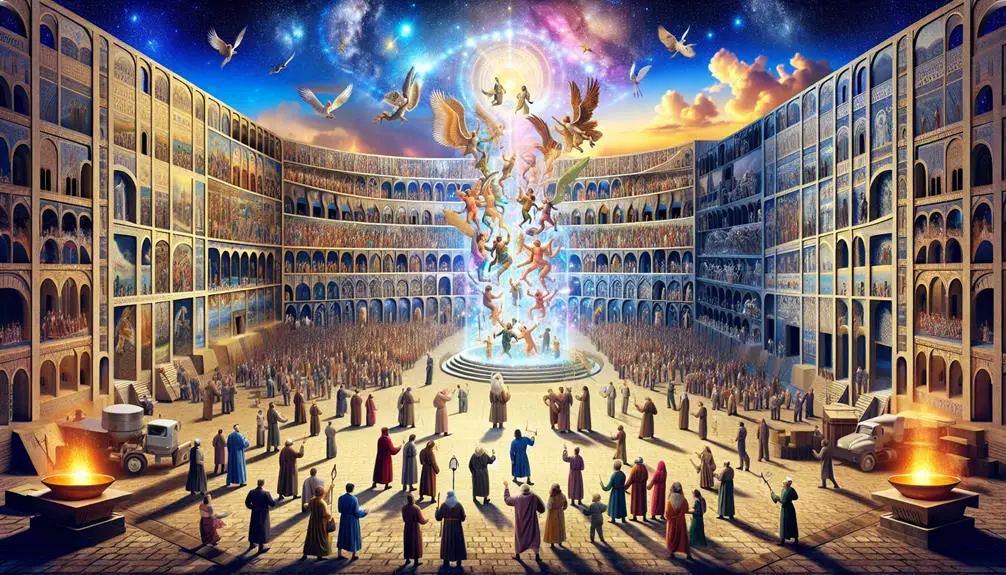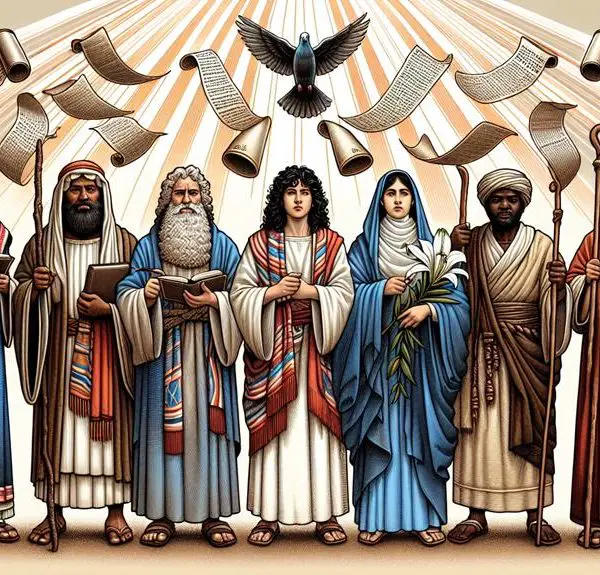Unlock the secrets behind Atlantis and its surprising connections to biblical tales, revealing truths about divine judgment and human nature.

Atlantis in the Bible
Nearly 60% of people have heard of Atlantis, the sunken city, but few have considered its possible connections to biblical narratives. You might find it intriguing that tales like the Great Flood or the Tower of Babel share underlying themes with the legend of Atlantis: divine judgment, human hubris, and sudden downfall.
These stories, deeply embedded in human consciousness, transcend cultural boundaries and time periods, hinting at universal truths. By exploring this intersection, you're not just revisiting ancient myths; you're uncovering layers of human belief and divine intervention that could shed light on some of history's greatest mysteries.
Let's embark on this journey together, shall we?
Key Takeaways
- Atlantis and biblical flood narratives share themes of divine judgment and moral accountability.
- Water symbolism connects Atlantis stories with biblical accounts of creation and destruction.
- Both narratives offer moral and spiritual lessons on hubris, redemption, and divine will.
- Scriptural echoes in Atlantis narratives reveal deeper insights into human condition and divine justice.
The Legend of Atlantis

The legend of Atlantis, first mentioned by Plato, has captivated historians and scholars alike with its tale of a highly advanced civilization that supposedly vanished beneath the waves. Plato's account, documented in his dialogues 'Timaeus' and 'Critias,' serves as the primary source of information about this enigmatic city-state. According to Plato, Atlantis was a naval power that lay 'in front of the Pillars of Hercules,' which many interpret as the Strait of Gibraltar. Its people were described as being prosperous and technologically advanced, but their society eventually succumbed to moral decay, leading to their downfall and the city's disappearance into the sea.
Your understanding of Atlantis can't be complete without delving into the realm of underwater archaeology. This field has provided insights into ancient civilizations, offering a tangible, albeit sometimes fragmented, picture of their existence. While no definitive evidence has been found to confirm the location or existence of Atlantis as described by Plato, underwater archaeology has uncovered submerged settlements and artifacts that hint at the possibility of advanced societies that met similar fates. These findings encourage a more nuanced interpretation of Plato's account, suggesting that it could be a composite of different historical events or an allegorical tale rather than a factual report.
In analyzing the legend of Atlantis, you're encouraged to consider the broader implications of Plato's account and the contributions of underwater archaeology. These perspectives provide a richer understanding of ancient civilizations and the enduring allure of Atlantis in the collective imagination.
Biblical Flood Narratives

You may find that the Biblical flood narratives, particularly those surrounding Noah's Ark, carry profound symbolic meanings which merit close analysis.
These stories aren't merely historical accounts but are rich in metaphorical layers that speak to themes of renewal, judgment, and salvation.
Through examining Noah's Ark, you'll uncover insights into how ancient cultures interpreted their relationship with the divine and the natural world.
Flood's Symbolic Meaning
In biblical flood narratives, water's destructive power often symbolizes a divine mechanism for purging and renewal, reflecting deep moral and theological undertones. This cleansing isn't merely physical but deeply spiritual, serving as an environmental allegory and a call for moral adaptation. The flood represents a reset, where the corruption of the past is washed away, and a new beginning is granted to those who are righteous and in harmony with divine will.
- Environmental Allegory: The flood narrative serves as a metaphor for environmental balance and the consequences of its disruption.
- Moral Adaptation: It underscores the necessity for societies to adapt morally, aligning with virtues that sustain life and community.
- Divine Renewal: The waters symbolize a profound transformation, offering a second chance through divine grace and wisdom.
Noah's Ark Analysis
Analyzing Noah's Ark within the biblical flood narratives reveals a complex interplay of themes concerning survival, obedience, and divine intention. The Ark's construction is a testament to Noah's unwavering faith and compliance with divine commands. It symbolizes a vessel of salvation, both literally and metaphorically, amid a world engulfed in divine judgment.
Aspect |
Significance |
|---|---|
Ark Construction |
Represents meticulous obedience to divine specifications |
Animal Pairs |
Symbolizes the preservation of life and biodiversity |
Survival |
Embodies hope and a new beginning |
Divine Intention |
Demonstrates a reset for humanity and nature |
This analysis underscores the profound narrative layers, where the Ark and its cargo of animal pairs become more than a story of survival—they encapsulate a divine blueprint for regeneration and renewal.
Tower of Babel Insights

Exploring the Tower of Babel narrative offers insights into the complexities of human ambition and divine intervention as depicted in biblical texts. This story, found in the Book of Genesis, highlights the early stages of civilization when humanity, speaking a single language, aspired to build a tower reaching the heavens. Their ambition, driven by the desire for fame and the fear of dispersion, ultimately led to divine intervention that introduced linguistic diversity to ensure human diversity and limit the potential for unified human hubris.
The Tower of Babel narrative is rich with themes and lessons, but focusing on linguistic diversity and construction technology provides a particularly enlightening perspective. By examining these aspects, you gain a deeper understanding of the story's implications for human collaboration and technological advancement.
- *Linguistic Diversity*: The introduction of multiple languages as a divine intervention to scatter humanity and prevent unified rebellion against divine authority underscores the importance of communication in human collaboration and societal development.
- *Construction Technology*: The attempt to build a tower 'with its top in the heavens' reflects the ancient human ambition for technological advancement and exploration. It also hints at the limitations of human achievement in the face of divine will.
- *Human Ambition vs. Divine Will*: The narrative serves as a cautionary tale about the limits of human ambition when it challenges divine authority. It suggests that while ambition drives progress, it must be tempered with humility and respect for natural laws.
Parallels in Lost Cities

You'll find that among lost cities, shared myths often reveal a common thread of catastrophic events, notably reflected in stories of the Biblical flood and the downfall of Atlantis.
These narratives not only highlight the loss of civilizations but also pose significant questions about the intersection of mythology and historical evidence.
As you explore these parallels, consider how they enrich our understanding of ancient societies and their perceptions of existential threats.
Ancient Cities: Shared Myths
Numerous ancient cities, including Atlantis, share myths that reveal intriguing parallels and highlight humanity's fascination with the concept of lost civilizations. These narratives often reflect cultural diffusion, where stories and beliefs migrate across cultures, leading to mythological adaptation. This process can blur the lines between historical fact and imaginative fiction, compelling us to consider how shared myths shape our understanding of ancient cities.
- Cultural Diffusion: The spread of stories across different civilizations, contributing to a collective mythos.
- Mythological Adaptation: How original myths evolve when they integrate into different cultures, sometimes altering core elements.
- Shared Myths: Common themes and narratives across cultures that underline a universal curiosity about lost cities and civilizations.
Analyzing these aspects sheds light on the complex tapestry of human history and myth.
Biblical Flood: Lost Civilizations
Building on the understanding of shared myths across ancient cities, it's crucial to examine how the story of the Biblical flood offers insights into lost civilizations, reflecting universal themes of destruction and renewal.
This narrative, deeply embedded in cultural memories, parallels the fate of cities submerged by natural disasters, potentially hinting at ancient climate change events. Archaeological discoveries continue to unearth settlements that vanished under catastrophic conditions, mirroring the Biblical account's dramatic tales.
These findings not only validate historical records but also emphasize the fragility of human societies in the face of environmental shifts. As you delve deeper, it becomes apparent that these stories, far from mere myths, may hold crucial lessons on resilience and adaptation in the face of inevitable climate change.
Mythology Vs. Historical Evidence
Distinguishing between mythology and historical evidence presents a complex challenge when exploring the parallels in lost cities. You're navigating a labyrinth of cultural interpretations and archaeological controversies, seeking the truth shrouded in tales and ruins.
- Cultural Interpretations: The way societies remember and mythologize lost cities varies greatly, influencing how we perceive these places today.
- Archaeological Controversies: Disagreements among scholars about the authenticity and interpretation of findings often arise, complicating the quest for historical accuracy.
- Lost Cities as a Bridge: They serve as a bridge between myth and history, where the lines often blur, making definitive conclusions elusive.
Analyzing these aspects requires a balanced approach, where you weigh the mythical narratives against tangible archaeological evidence, always mindful of the biases that cultural interpretations and controversies introduce.
Divine Judgments Explored

In exploring divine judgments within the context of Atlantis narratives, one must carefully consider the intricate balance between myth and theological interpretation. The Atlantis story, often steeped in layers of allegory and legend, serves as a fertile ground for discussing themes of moral accountability and apocalyptic prophecies. These elements aren't merely ornamental but central to understanding the deeper messages possibly embedded within the tale.
You'll find that moral accountability plays a pivotal role in the Atlantis story, as it often does in narratives involving divine judgment. The citizens of Atlantis, according to various accounts, are portrayed as having fallen from grace due to their ethical and moral failings. This concept mirrors a common theme in theological discussions, where divine retribution is seen as a consequence of moral bankruptcy. The Atlantis narrative can be interpreted as a cautionary tale, warning of the dangers of ethical complacency and the inevitable divine judgment that follows.
Apocalyptic prophecies, another key aspect of divine judgments, also find their resonance in the Atlantis narrative. The sudden and catastrophic end of Atlantis echoes apocalyptic themes common in many religious texts, where the end of a civilization or world comes as a result of divine intervention. This not only underscores the theme of moral accountability but also highlights the transient nature of power and the ultimate sovereignty of the divine.
Analyzing Scriptural Echoes

Through a careful examination, you'll uncover that the Atlantis narrative bears striking scriptural echoes, revealing deeper layers of meaning and connection to ancient texts. This analysis not only enriches your understanding of Atlantis but also sheds light on the broader context of scriptural geography and prophetic allegories.
In exploring these echoes, it's essential to consider:
- The role of water in both narratives: Water, as a symbol of both creation and destruction, plays a pivotal role in the stories of Atlantis and various scriptural accounts, underscoring the theme of divine judgment.
- The concept of a chosen people: Just as Atlantis is depicted as a civilization blessed with knowledge and prosperity before its fall, many scriptural stories also highlight a chosen group or people who are tested by their divine benefactor.
- Moral and spiritual lessons: Both the Atlantis narrative and scriptural texts often convey moral and spiritual lessons through their accounts of human hubris, divine retribution, and the possibility of redemption.
These parallels suggest that the story of Atlantis, whether viewed as myth or metaphor, resonates with scriptural themes of loss, judgment, and moral teaching. The integration of scriptural geography adds a tangible layer to the Atlantis myth, situating it within a framework that transcends mere fantasy. Similarly, the use of prophetic allegories enriches the narrative, offering insights into the human condition and the divine nature of justice and mercy. By analyzing these scriptural echoes, you engage in a multidimensional exploration of ancient wisdom and its relevance to both the past and the present.
Frequently Asked Questions
How Do Historical Accounts Outside the Bible, Such as Those by Plato, Compare in Detail to the Biblical Narratives When Discussing Lost Civilizations?
When you delve into historical accounts like Plato's philosophy, compared to biblical narratives on lost civilizations, you'll notice distinct differences.
Plato's accounts, rich in philosophical insights, often present a more allegorical perspective, focusing on moral and societal decay.
In contrast, biblical narratives, steeped in symbolism, offer moral lessons intertwined with divine intervention.
Both, while divergent in approach—Plato's analytical, the Bible's symbolic—provide profound insights into the human condition and societal structures.
Are There Any Archaeological Findings That Suggest a Link Between the Story of Atlantis and Locations Mentioned in the Bible?
You're diving into a sea of speculation when you search for archaeological evidence linking Atlantis to Biblical locations. Despite the allure of mythical symbolism and the hope of uncovering hidden truths, no concrete findings bridge these stories.
Geographic inconsistencies further muddy the waters, making a direct connection elusive. Scholars remain skeptical, as the quest for Atlantis often reveals more about human imagination than historical fact.
How Have Different Cultures and Religions Around the World Interpreted the Concept of Atlantis in Comparison to the Biblical Flood Story?
You'll find that cultures and religions globally have interpreted the concept of Atlantis through their own lenses, often drawing parallels with the biblical flood story. This blending showcases a form of cultural appropriation, where the mythical symbolism of Atlantis is adapted to fit various narratives.
Such interpretations reflect an analytical examination of how societies use myth to understand their world, illustrating the universal theme of cataclysm and rebirth in human storytelling.
Can Linguistic Studies Provide Insight Into Connections Between the Names, Places, and Descriptions Found in the Atlantis Story and Those in the Bible?
Absolutely, linguistic studies can shed light on the connections between names, places, and descriptions in ancient texts. By examining name etymology, you'll uncover layers of meaning that often resonate with Biblical metaphors, revealing deeper insights.
This approach isn't just about matching words; it's about understanding the cultural and historical contexts that influence how stories are told. So, diving into linguistic analysis helps you grasp the nuanced dialogue between different ancient narratives.
What Role Does Modern Scientific Theory, Such as Plate Tectonics or Climate Change, Play in Supporting or Refuting the Possibility of a Real Event Similar to Atlantis in the Context of Biblical History?
You're diving into how modern science, like plate tectonics and climate change, influences our understanding of ancient, lost civilizations.
Ocean exploration and genetic markers open new doors to evidence that could prove or disprove the existence of such places.
Analyzing these scientific theories and data helps discern if there's a factual basis behind legends, possibly connecting them to real historical events or phenomena without directly linking to biblical narratives.
Conclusion
In conclusion, while you've diligently sifted through the narratives, aligning Atlantis' legend with Biblical floods and the Tower of Babel, the irony isn't lost that both sources – one steeped in myth, the other in sacred text – converge on themes of divine judgment and lost cities.
This exploration, scholarly in its approach, subtly underscores the universal penchant for stories of downfall and redemption. Yet, it's amusing how, in seeking parallels, we've perhaps unearthed more about our interpretive desires than about Atlantis itself.



Sign up